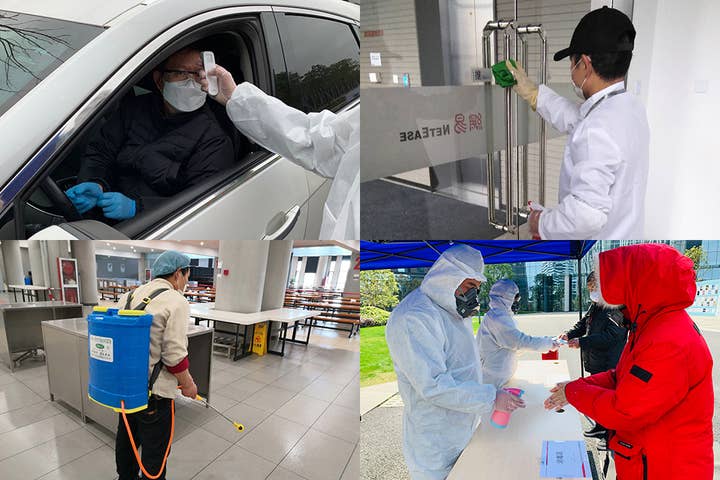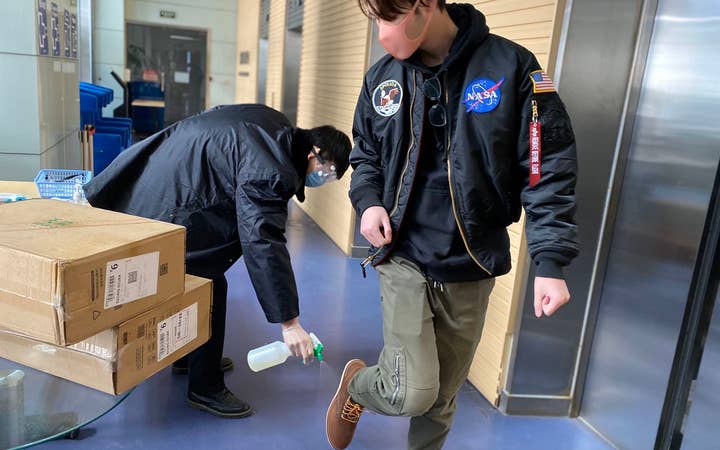After the lockdown: China studios on returning to work
Chinese developers share lessons learned from remote working and their efforts to prevent a second wave of COVID-19
In China, the coronavirus crisis accelerated during the nation's Spring Festival. For the first time in over 100 years, most of the planned celebrations were cancelled.
The combined timing of the event and the outbreak exacerbated the impact on day-to-day working life, with people travelling across the country to be with their friends and families. Like so many industries, China's game development scene immediately felt the effects.
"We were caught unprepared," admits Gilles Langourieux, CEO of Virtuos, a work-for-hire developer with multiple studios in the country. "People were on holiday, so we weren't able to avoid having on average two weeks of complete shutdown."
Ubisoft Shanghai's studio operations director Chen Ming Jian adds: "Before this crisis, our teams had the option to work remotely from time to time. Scaling those processes up to our full studio, however, was a new challenge. Many of our developers require access to specific technologies, and teams across Ubisoft went the extra mile to ensure they were equipped.

"With teams divided across so many regions [for Spring Festival], we had to streamline our communication channels and services. We received a flood of questions, and our HR and IT teams were in particularly high demand. We did our best to make sure there was always someone available to provide support and find solutions."
Chinese companies quickly adapted to remote working. NetEase subsidiary 24 Entertainment received plenty of support from its parent, as did the rest of the publisher's employees.
Staff were provided with VPNs to ensure they could access internal networks and office computers. The company also set up mobile apps such as Daily Health, where employees could clock in with a self-examination reporting any coronavirus symptoms, and a customised version of Zoom called WebMeeting.
NetEase HR director Milano Wang says two days before total lockdown, her department had already set up an emergency protocol team to deal with the situation.
"We had already purchased a lot of face masks for employees who were planning to head back to their hometown for the Spring Festival. For those whose hometowns were epicentres, we reached out to them and tried to persuade them into not returning home because the whole situation could be very dangerous. Some of them were persuaded and decided to stay in Hangzhou, which made their lives after Spring Festival much easier as they avoided a long-time lockdown in Hubei Province.
"When we returned, there was a level of energy... People were happy to be back at work and [had] bonded because we went through this together"
Gilles Langourieux
"Some of them were not that cautious at the time. They went back to their hometowns, which brought much more inconvenience for their lives."
Ubisoft and Virtuos both benefited from their global operations, with studios already working closely together digitally. As such, the shift to remote work was somewhat easier, but the spread of coronavirus around the world has disrupted different teams at different times.
Virtuos, for example, now has its Chinese studios back up and running, but its office in Vietnam is preparing to go remote if the government advises, and its European teams are now entirely working from home.
"In a way we're probably better prepared than many studios because 100% of our work is distributed from clients to us," Langourieux explains. "When we have to work remotely, we don't have to change the processes. We need to find technical solutions to technical problems, find ways to keep in touch with our staff and keep them motivated. We already have solutions to distribute the work, to keep track of the work that's happening, and to review the work remotely."

Regardless of how well processes are set up for remote working, there's no avoiding an impact on productivity. 24 Entertainment producer Ray Kuan found working from home to be more tiring than working in the office.
"When I'm working in an office, I only have to attend one meeting at a time," he says. "When I'm at home, there have been circumstances where I've had to attend three meetings simultaneously. I'm working all the time between sleeps, so during the time I was working at home I was desperate to go back to working in an office every day.
"The process was gradual. The first week, we only allowed 30% of employees to return. The next week, 50%, then 80%, then we officially allowed all employees back to the office"
Milano Wang, NetEase
"Everyone felt more tired while working at home. The productivity was slightly decreased. I think it's because even though we have lots of software that helps us communicate smoothly online, it's still not as efficient as communicating with each other face-to-face."
He adds that there were more distractions, which, while unavoidable, did limit how much staff could accomplish. Virtual meetings were disrupted by children and babies crying, a grandma playing Mahjong online, and even a cat stepping on a keyboard. These placed pressure on developers trying to keep up with their workload.
The result was the studio had to delay the development of a demo intended for the media at GDC. The fact that GDC was postponed partially mitigated this loss, but development of the game was still pushed back.
"It's a loss, but it's also provided us with an opportunity to better prepare the whole demo," says Kuan.
COVID-19's rapid spread around China meant some companies were unable to adapt all these processes for remote working. With so many of its development teams on extended holiday around the Festival, Virtuos could only get its management up to speed.
"Because the decision was so sudden, we couldn't get the operations set up to enable most of our developers to work remotely," says Langourieux. "All we could do remotely was prepare for the return to work -- and that was done very efficiently. We were one of the first companies to return to work.

"For our various other studios [around the world], we had advance notice and already had solutions in place so we were able to get all the development teams to work remotely. Nevertheless, we have noticed a drop in productivity. I wouldn't say it's a huge drop -- a studio of 60 people working on four different projects were able to make all their deliveries on time during the first week of working from home... It's a drop, but probably only between 15% and 25%."
Offering emotional support to staff working at home also demanded the creation of new processes. Virtuos turned to social networks, such as China's WeChat. Establishing a variety of groups, not just for specific teams but across the studio, helped actively engage people during such an unorthodox period.
"There was a lot of banter going on," says Langourieux. "People had a channel where they could talk about what they're doing at home, their questions, worries, joys -- it made that difficult period a little easier. And it does create bonds. When people returned, we saw there was a level of energy that was a combination of people being happy to go back to work and also having bonded more because we went through this together.
"Also, during this period, we made sure that HR was talking on a daily basis to every person. Just a quick call, 'Hey, how are you doing? How are you feeling? Anything we can help with?' So there was also that extra bonding between staff and their managers, which had a positive impact when people returned."
NetEase, meanwhile, set up a 24-hour hotline for all employees, interns and even their families staffed by psychologists and consultants, plus online courses on how to manage emotions in such a turbulent time.

Eventually, the lockdown lifted. But developers were understandably cautious about returning to work. Ubisoft Shanghai encouraged people to continue working from home if they could. Anyone who had been working in areas on full lockdown, or had travelled outside of the city for the holidays, were required to self-isolate for 14 days before coming to the office. Some were simply trying to balance childcare and work.
Ubisoft's HR team put together a health plan to ensure safe working conditions. Health checkpoints were set up at the entrance to the office, masks were offered at reception, hand sanitiser stations were installed throughout the building, and even the soles of people's shoes were cleansed.

"Ahead of their return, we also gave teams a safety guide outlining how they could protect themselves and their teammates in the office," says Ming Jian. "We offered everyone a welcome back package with items like masks, vitamin C, magic body heating pads, protective gloves, and mini hand sanitizers. It was the first time many of us had seen each other since the Chinese New Year."
In early February, the official greenlight was given to return to work and, a week later, most were back in the studio. Home working was still allowed if staff chose, because it was "important they do what is best for themselves and their families."
Ming Jian continues: "At the end of confinement, many of our teams were eager to return to the studio. We all needed a break from home life. They were excited to see their teammates again, and they expressed a newfound appreciation for the comforts of the office -- large workstations, double and sometimes triple screens, faster internet connections. This experience taught us a lot about remote work in a very short amount of time, and it will help us to improve our processes and support for the future."
Preparations at NetEase and 24 Entertainment were just as extensive. During the first month after returning to work, the publisher's Hangzhou headquarters issued 250,000 masks, 8,720 bottles of sanitiser, and measured body temperatures 250,000 times.
"We had a newfound appreciation for office comforts - large workstations, double and sometimes triple screens, faster internet"
Chen Ming Jian, Ubisoft Shanghai
In addition, the entire office was deep-cleaned every day, elevators were only accessible to people who worked on the fifth floor or higher, and air conditioners were turned off in favour of window ventilation.
"To determine which employees could return to work, the office had a very prudent policy and we made decisions in a very cautious way," Wang explains. "First, we inquired with the government to seek official data about new cases and cured cases in Hangzhou City, as well as the whole country. We didn't want our employees to return to the office until the situation is stable.
"The whole returning to work process was a gradual process. The first week, we only allowed 30% of employees to return to work. The next week, 50%. The next week, 80%. And the next, we officially allowed all employees to go back to the office."
Even with the full team back at work, Kuan reports remote working has emphasised the need for a healthier work-life balance. In fact, improved communication skills means staff are actually working less hours in the office than before.
"It means they can deal with trivial problems when they're back at home and have more time to share with family," he says. "The whole studio is improving its productivity after the coronavirus crisis, because we're improving our workflow and improving our teamwork among our members.

"This coronavirus crisis has raised awareness about personal hygiene in most people in China. We've also learned about online working -- simple things like if you're having an online meeting, you can wear smart clothes on the top of your body, but wear pyjamas where people can't see. It makes working a bit more comfortable."
Ubisoft's Ming Jian says the move to working from home has also brought about a "mindset shift."

"While remote work is not new to us, this was the first time we deployed it on such a large scale," he says. "The experience taught us a lot about productivity, meetings, and collaboration tools. We organised entire studio meetings on livestreams, deployed new tech and developed new collaboration processes. In the future, I'm sure we'll be more likely to ask ourselves, 'Does it make sense to do this in person or can we best achieve it online?'"
Ming Jian reports the impact of COVID-19 on Ubisoft's production has actually been minimal, with no changes to the release schedule for the upcoming fiscal year.
Similarly, Langourieux says that even with the two weeks lost at its China studios, most of the disruption was absorbed by the end of March. This is in part thanks to the 5% to 10% of staff that are usually "benched" and could be called in, and the option to distribute work to other studios. Plus, a majority of the returning Chinese developers were willing to do some paid overtime -- "working a couple of Saturdays a month, for example, to compensate for the days that were lost."
But for Langourieux, the biggest lesson learned during the lockdown period in China was this: "The reason people were sent home is because we were trying to contain an epidemic, and that worked.
"If there's one thing we'd like to attest to, it's that social distancing and working from home has allowed China and some of the cities where we work like Chengdu and Shanghai, we're not very affected by the virus. We've really seen that. We had people in those cities, and we saw that the cases never went above a few hundred people. You had literally thousands in Wuhan and Hubei Province.
"So if there's one word of hope, it's that there was a good reason for that, and it worked. If we had to do it again, just as when we were asked to do it again in France, there will be no hesitation."
